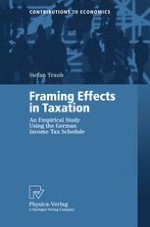1999 | OriginalPaper | Buchkapitel
Upshot: (How) Should Economists React to Framing Effects?
verfasst von : Dr. Stefan Traub
Erschienen in: Framing Effects in Taxation
Verlag: Physica-Verlag HD
Enthalten in: Professional Book Archive
Aktivieren Sie unsere intelligente Suche, um passende Fachinhalte oder Patente zu finden.
Wählen Sie Textabschnitte aus um mit Künstlicher Intelligenz passenden Patente zu finden. powered by
Markieren Sie Textabschnitte, um KI-gestützt weitere passende Inhalte zu finden. powered by
How should economists react to framing effects? The experimental and empirical evidence in favor of the framing hypothesis is overwhelming. The endwoment effect has amply proven its power of resistance to attempts to eliminate it by aid of (monetary) incentives and demand revealing mechanisms. Apparently, the status quo bias turns out to be even stronger under real world settings than in the laboratory. Incidents such as the credit card lobby case (Thaler, 1980), Minister Rönsch’s withdrawal, and the car insurance field study (Johnson et al., 1993) show that framing effects can exhibit a far-reaching practical importance. Moreover, the “empirical marketing literature is no doubt replete with findings that we could legitimately interpret as real-world framing effects” (Machina, 1987, p. 145), that is, manipulating the frame already is a commonly accepted and used business method.1
